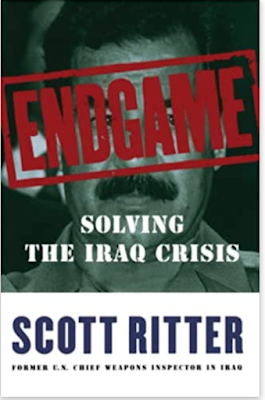Ritter, Scott, Endgame, Solving The Iraq Crisis, New York: Simon & Schuster, 2002
Endgame, Solving The Iraq Crisis was Scott Ritter venting his frustration with the United Nations weapons inspections in Iraq in the 1990s. Ritter was one of the chief inspectors and believed that the United States gave up on the process and allowed Iraq to hide its weapons of mass destruction. A few years later however he completely flipped around his perspective questioning the Bush administration’s argument to remove Saddam Hussein in 2003.
Right from the start Iraq failed to cooperate with the United Nations. In 1991 Baghdad issued its weapons declaration. Chief inspector Rolf Ekeus wrote a letter noting that the document was incomplete because it didn’t mention things like the industrial infrastructure that Iraq created to build missiles and WMD. Saddam then set up a Concealment Committee that ordered all WMD, nuclear and missile equipment be collected from facilities and hidden away. Then inspectors came across the Iraqis driving away with equipment used in its nuclear program which was never declared. Later documents were discovered about WMD testing. The nail in the coffin was when Saddam’s son-in-law Hussein Kamal defected to Jordan in 1998 and described all kinds of materials Iraq was hiding. Ritter explains that from the start Baghdad thought the inspections would be temporary and therefore had no reason to cooperate with them. When they went on for years the regime doubled down and tried to hide things over and over and over again.
That led to the second stage of the inspections led by Ritter which was discovering how Iraq’s concealment program worked. Backed by the CIA and Mossad, the U.N. would conduct inspections and then tap into Iraqi communications to find out how they reacted. They discovered where materials were moved to, who was in charge, and what security organizations were involved. That’s what led the inspectors to move from WMD sites to security agencies and presidential palaces because that’s where the Iraqis were hiding things. This led to one confrontation after another, new U.N. resolutions and a few strikes by the United States to try to force Saddam to comply. You can feel Ritter’s passion for this period because it dominates the book. He argued that it showed that the inspections were working because they were finding more and more information about how the Iraqi government was hiding things and becoming more desperate.
That led to Ritter’s frustration however as he writes that the Clinton administration lost patience with the process. At first the U.S. was one of the main countries pushing for inspections. It coordinated with them to pressure Iraq with the threat of military strikes as the stick to get them to cooperate. By the late 1990s the White House decided on a containment policy. The hope was that Iraq would turn out like Cuba. It could claim it was doing something about Saddam by maintain sanctions but in reality it just wanted to forget about it. The U.N.’s work in Iraq was preventing that from happening as Saddam constantly stopped working with the inspectors which caused a new crisis in the Security Council. The U.S. finally gave up on continued weapons searches and so the inspections were allowed to end in 1998. Ritter believed this was a betrayal because the process was working and he believed that Iraq’s entire process of hiding material could have been unraveled with more time and backing.
The ending of Endgame is very confusing as Ritter flip flops on his position. In the late 90s after the inspections ended he said that Iraq was still a regional threat and advocated for overthrowing Saddam even if the United States had to act by itself. Then his afterward was written in 2002 when the Bush administration was pushing war and working unilaterally but this time Ritter was against it. He talked about how the White House’s argument about Iraq’s WMD was weak and not based upon the facts. What caused Ritter to make an about face is never explained but he even went to Iraq to voice his opposition to the coming 2003 invasion. Perhaps he became so angry with the American government that it took so long to re-focus upon Iraq he lost faith in it. it is a pretty amazing transformation.
Endgame, Solving The Iraq Crisis is a very short and interesting read. It presents a good story of how Iraq dealt with the weapons inspections and why they were never successful because Baghdad never came clean about what it did. Saddam wanted to maintain his weapons to deal with his rivals in Israel and Iran and thought the U.N. would only be in his country for a few months. What Ritter missed is that the inspections were so successful Iraq destroyed all its WMD and ended its nuclear program which it told the U.N. about but which wasn’t believed. That’s because Iraq did it secretly without documenting it. It was still hiding documents from those programs which was what Ritter was hot on the trail of. He thought those papers would lead to the actual weapons but they no longer existed. This view was shared by Western powers and would lead to the Iraq War.
Link to all of Musings On Iraq’s book reviews listed by topic





No comments:
Post a Comment